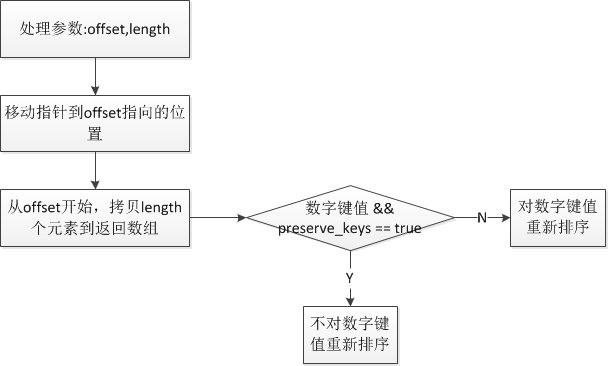This article mainly introduces the array_slice and array_splice functions in php. If you are interested, you can take a look.
array_slice and array_splice functions are used to take out a slice of the array. array_splice can also be replaced with a new slice. The original function of deleting slice positions. Similar to the Array.prototype.splice and Array.prototype.slice methods in javascript.
array_slice
array array_slice ( array $array , int $offset [, int $length = NULL [, bool $preserve_keys = false ]] )
Returns the subarray slice of the specified subscript offset and length in the array.
Parameter description
Suppose the length of the first parameter array is num_in.
offset
If offset is a positive number and less than length, the returned array will start from offset; if offset is greater than length, no operation will be performed and it will be returned directly. If offset is a negative number, then offset = num_in+offset, if num_in+offset == 0, then offset is set to 0.
length
If length is less than 0, length will be converted to num_in - offset + length; otherwise, if offset+length > array_count, length = num_in - offset. If length is still less than 0 after processing, it will be returned directly.
preserve_keys
The default is false. The original order of numeric key values is not retained by default. If set to true, the original numeric key value order of the array will be retained.
Usage example
<?php
$input = array("a", "b", "c", "d", "e");
$output = array_slice($input, 2); // returns "c", "d", and "e"
$output = array_slice($input, -2, 1); // returns "d"
$output = array_slice($input, 0, 3); // returns "a", "b", and "c"
print_r(array_slice($input, 2, -1)); // array(0 => 'c', 1 => 'd');
print_r(array_slice($input, 2, -1, true)); // array(2 => 'c', 1 => 'd');Running steps
Processing parameters: offset, length
Move the pointer to the position pointed by offset
Start from offset, copy length elements to the return array
Run the flow chart as follows

array array_splice ( array &$input , int $offset [, int $length = 0 [, mixed $replacement = array() ]] )
<?php
$input = array("red", "green", "blue", "yellow");
array_splice($input, 2);
// $input变为 array("red", "green")
$input = array("red", "green", "blue", "yellow");
array_splice($input, 1, -1);
// $input变为 array("red", "yellow")
$input = array("red", "green", "blue", "yellow");
array_splice($input, 1, count($input), "orange");
// $input变为 array("red", "orange")
$input = array("red", "green", "blue", "yellow");
array_splice($input, -1, 1, array("black", "maroon"));
// $input为 array("red", "green",
// "blue", "black", "maroon")
$input = array("red", "green", "blue", "yellow");
array_splice($input, 3, 0, "purple");
// $input为 array("red", "green",
// "blue", "purple", "yellow");/* Don't create the array of removed elements if it's not going
* to be used; e.g. only removing and/or replacing elements */
if (return_value_used) { // 如果有用到函数返回值则创建返回数组,否则不创建返回数组
int size = length;
/* Clamp the offset.. */
if (offset > num_in) {
offset = num_in;
} else if (offset < 0 && (offset = (num_in + offset)) < 0) {
offset = 0;
}
/* ..and the length */
if (length < 0) {
size = num_in - offset + length;
} else if (((unsigned long) offset + (unsigned long) length) > (unsigned) num_in) {
size = num_in - offset;
}
/* Initialize return value */
array_init_size(return_value, size > 0 ? size : 0);
rem_hash = &Z_ARRVAL_P(return_value);
}php array function sequence array_slice()




